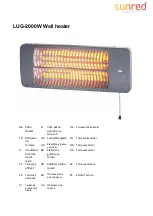
19
2
General venting
(continued)
Air inlet pipe materials:
The air inlet pipe(s) must be sealed. Choose acceptable
combustion air inlet pipe materials from the following list:
PVC, CPVC or ABS
Dryer Vent or Sealed Flexible Duct (not recommended
for rooftop air inlet)
Galvanized steel vent pipe with joints and seams sealed as
specified in this section.
Type “B” double-wall vent with joints and seams sealed as
specified in this section.
AL29-4C, stainless steel material to be sealed to
specification of its manufacturer.
*Plastic pipe may require an adapter (not provided) to
transition between the air inlet connection on the appliance
and the plastic air inlet pipe.
Installation & Service Manual
TM
WARNING
Using vent or air intake materials other
than those specified, failure to properly seal
all seams and joints or failure to follow vent
pipe manufacturer’s instructions can result
in personal injury, death or property
damage. Mixing of venting materials will
void the warranty and certification of the
appliance.
NOTICE
The use of double-wall vent or insulated
material for the combustion air inlet pipe is
recommended in cold climates to prevent
the condensation of airborne moisture in
the incoming combustion air.
Sealing of Type “B” double-wall vent material or galvanized
vent pipe material used for air inlet piping on a sidewall or
vertical rooftop Combustion Air Supply System:
a.
Seal all joints and seams of the air inlet pipe using either
Aluminum Foil Duct Tape meeting UL Standard 723 or
181A-P or a high quality UL Listed silicone sealant such as
those manufactured by Dow Corning or General Electric.
b.
Do not install seams of vent pipe on the bottom of
horizontal runs.
c.
Secure all joints with a minimum of three sheet metal
screws or pop rivets. Apply Aluminum Foil Duct Tape or
silicone sealant to all screws or rivets installed in the vent
pipe.
d.
Ensure that the air inlet pipes are properly supported.
The PVC, CPVC, or ABS air inlet pipe should be cleaned and
sealed with the pipe manufacturer’s recommended solvents
and standard commercial pipe cement for the material used.
The PVC, CPVC, ABS, Dryer Vent or Flex Duct air inlet pipe
should use a silicone sealant to ensure a proper seal at the
appliance connection and the air inlet cap connection. Dryer
vent or flex duct should use a screw type clamp to seal the vent
to the appliance air inlet and the air inlet cap. Proper sealing
of the air inlet pipe ensures that combustion air will be free of
contaminants and supplied in proper volume.
Stainless steel vent
This product has been approved for use with stainless steel using
the manufacturers listed in Table 2A.
Use only the materials, vent systems, and
terminations listed in Table 2B. DO NOT
mix vent systems of different types or
manufacturers, unless listed in this manual.
Failure to comply could result in severe
personal injury, death, or substantial
property damage.
WARNING
Installations must comply with applicable
national, state, and local codes. Stainless
steel vent systems must be listed as a UL-
1738 approved system for the United States
and a ULC-S636 approved system for
Canada.
NOTICE
Installation of a stainless steel vent system
should adhere to the stainless steel vent
manufacturer’s installation instructions
supplied with the vent system.
NOTICE
The installer must use a specific vent starter
adapter at the flue collar connection,
supplied by the vent manufacturer to adapt
to its vent system. See Table 2B for approved
vent adapters. Discard CPVC starter piece.
NOTICE
When a sidewall or vertical rooftop combustion air supply
system is disconnected for any reason, the air inlet pipe must be
resealed to ensure that combustion air will be free of
contaminants and supplied in proper volume.
DANGER
Failure to properly seal all joints and seams
as required in the air inlet piping may result
in flue gas recirculation, spillage of flue
products and carbon monoxide emissions
causing severe personal injury or death.
















































